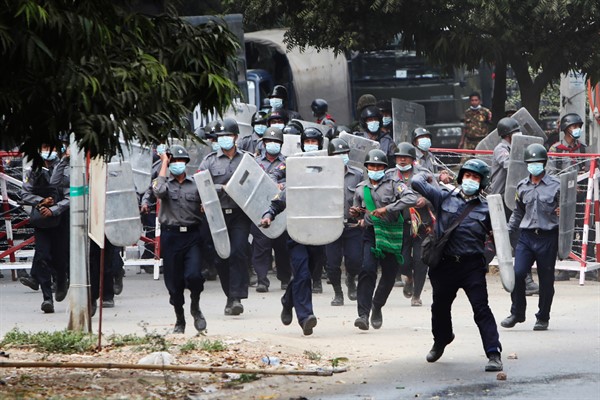Since seizing power in a coup in early February, Myanmar’s military, known as the Tatmadaw, has increasingly cracked down on civil society and the political opposition. In recent weeks, it has shuttered most independent media outlets; arrested many members of the former ruling party, the National League for Democracy, or NLD; declared martial law in parts of the country; and unleashed security forces on pro-democracy demonstrators. By one estimate, at least 200 people have been killed since protests began against the coup last month, and thousands of people have been detained. The real number of deaths is probably much higher, and the bloody repression seems to be escalating.
But apparently, Myanmar’s military rulers seek more than to wield brutal force—or at least, they had hoped to when the coup was launched. They have tried to legitimize their rule by gaining recognition from regional powers and international organizations, and by putting in motion a process that will supposedly lead to fresh elections in the future. As a number of other Southeast Asia scholars have argued, the junta is clearly looking to neighboring Thailand as an example of how to build such a democratic facade. Indeed, shortly after the coup, the Tatmadaw’s commander-in-chief, Min Aung Hlaing, contacted Thai Prime Minister Prayuth Chan-ocha, a former army chief who led his own coup in 2014, to ask for his assistance in instituting “democracy” in Myanmar. The Thai and Myanmar militaries have longstanding links, although they have also had to manage a history of tensions along disputed portions of their countries’ border. As Oren Samet recently noted in an article for The Diplomat, Min Aung Hlaing has received several royal decorations from Thailand, and has enjoyed close ties with a series of Thai army chiefs.
However, the Tatmadaw is unlikely to enjoy the same degree of success as the Thai military as it seeks to entrench a pseudo-democratic government. Its efforts to gain global recognition, for example, have thus far met with limited success, as foreign governments and international organizations have roundly condemned the killing of peaceful protesters by security forces. It is also unlikely to convince many of Myanmar’s citizens that it can implement a credible election. Meanwhile, the country’s growing pro-democracy uprising—known as the Civil Disobedience Movement, or CDM—has spread across the country, organizing mass demonstrations that have brought the economy to a virtual standstill. It is gaining global support and seeking to convince rank-and-file soldiers to defect, while also forming alliances with Thai pro-democracy demonstrators.

